2025新人教版七年级英语下册units 7~8 教材知识期末复习课件
文档属性
| 名称 | 2025新人教版七年级英语下册units 7~8 教材知识期末复习课件 | 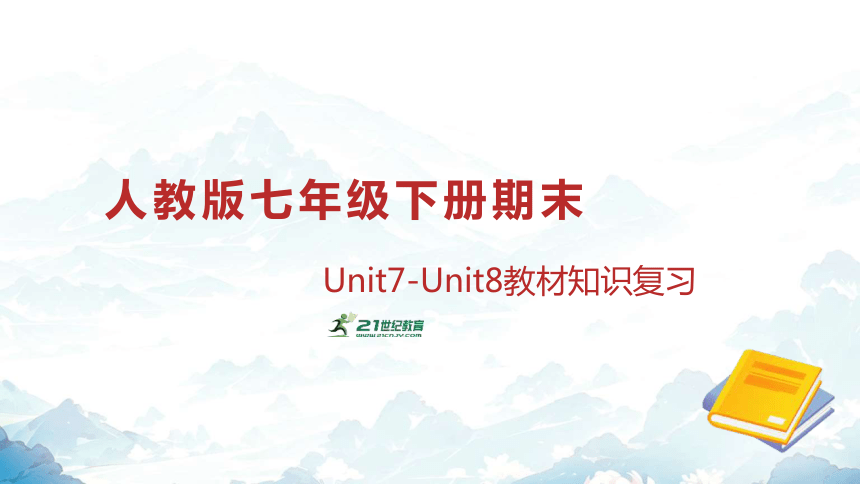 | |
| 格式 | pptx | ||
| 文件大小 | 3.1MB | ||
| 资源类型 | 试卷 | ||
| 版本资源 | 人教版 | ||
| 科目 | 英语 | ||
| 更新时间 | 2025-05-30 07:30:21 | ||
图片预览


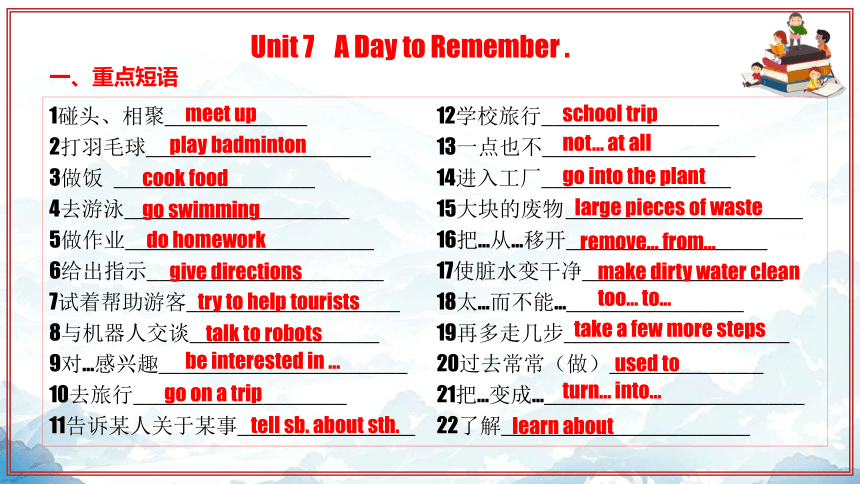
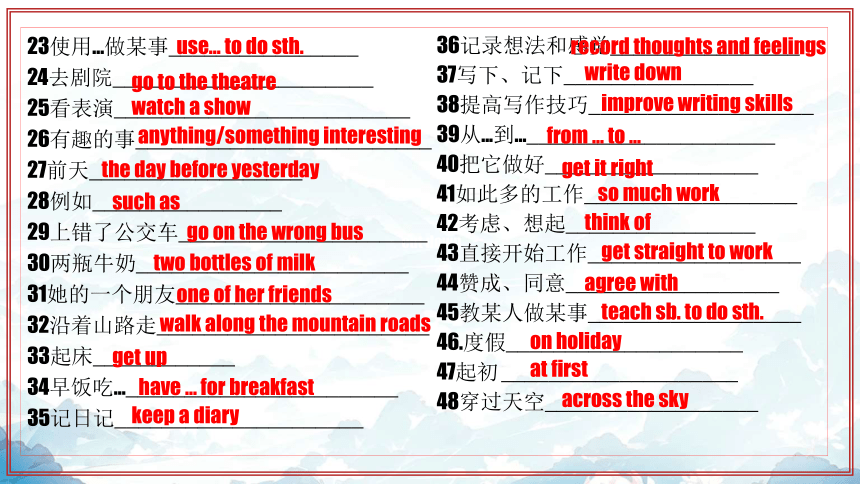
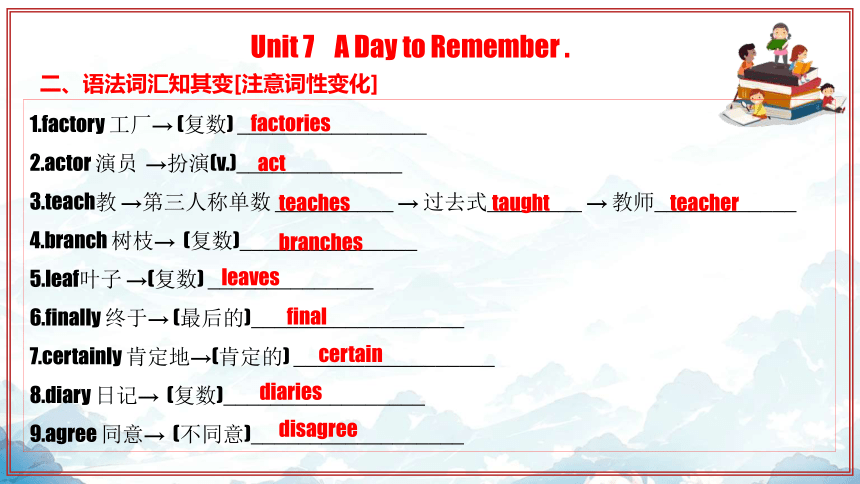
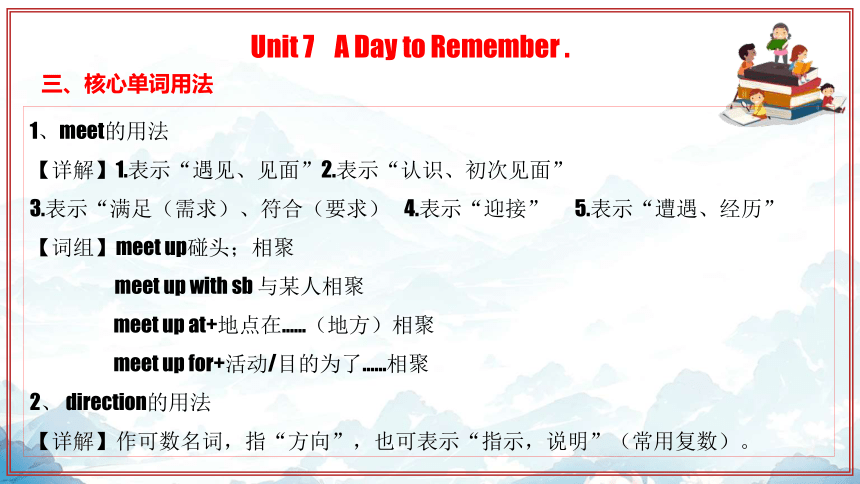
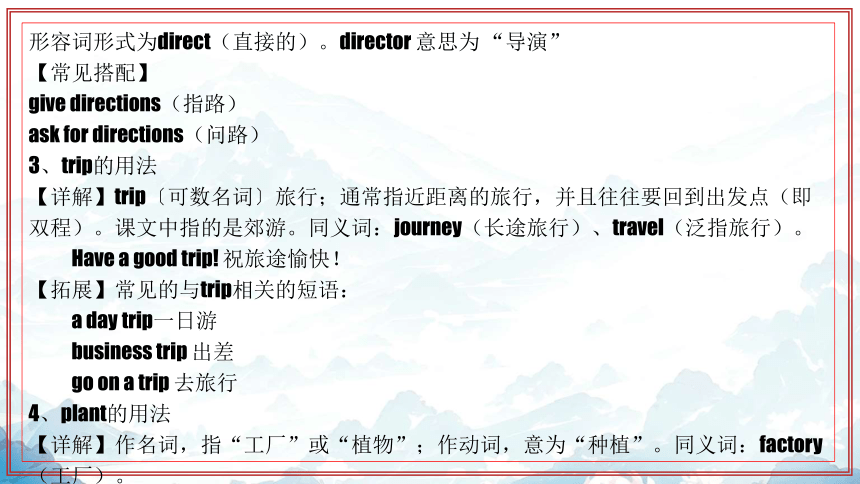
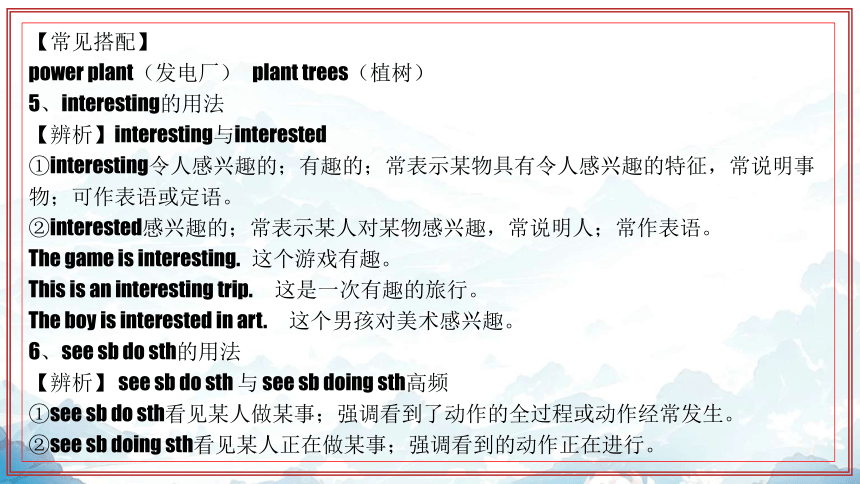
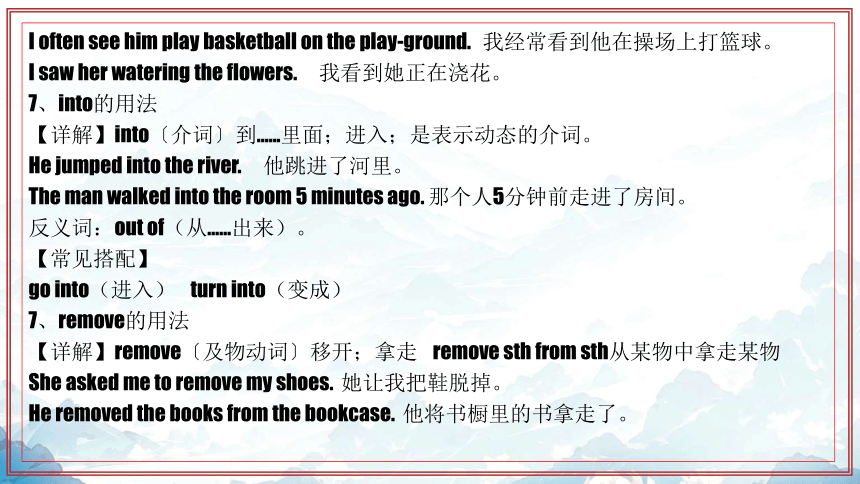
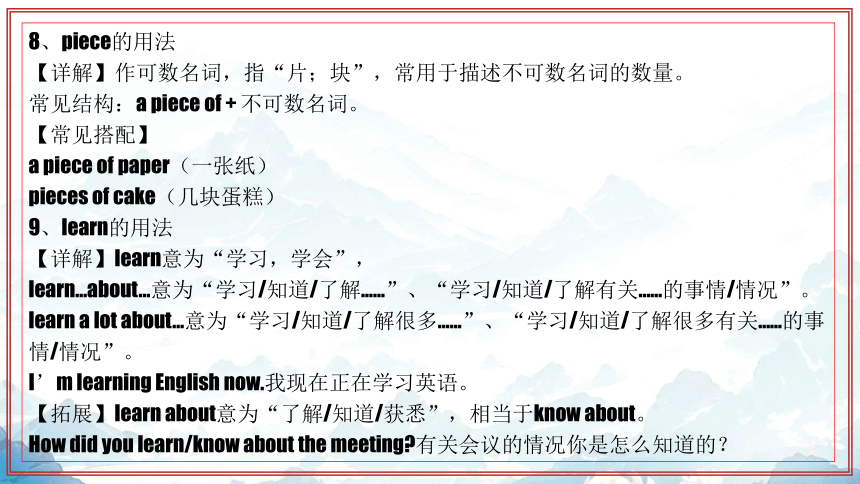
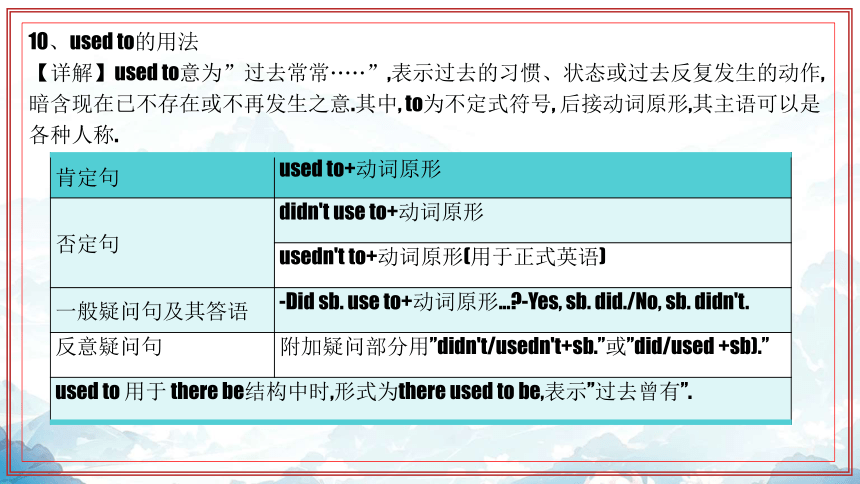
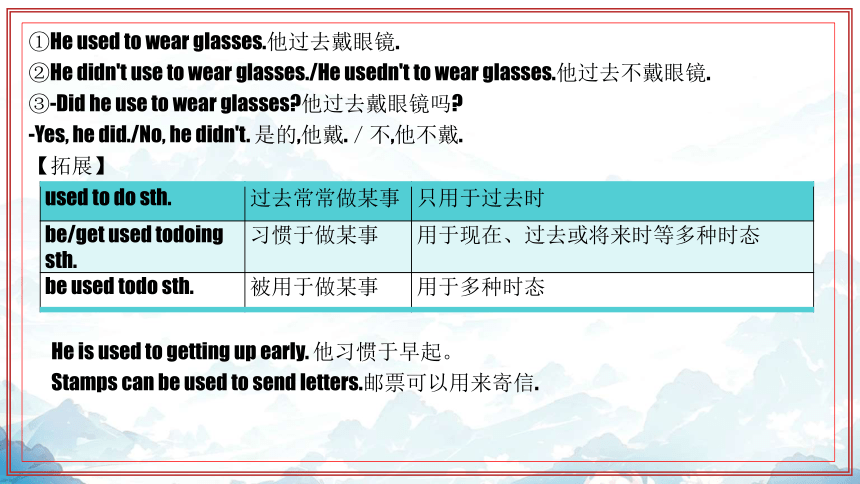
文档简介
(共58张PPT)
人教版七年级下册期末
Unit7-Unit8教材知识复习
目
录
CONTENT
Unit7-8 重点短语
语法精讲:一般过去时(I)的用法
语法精讲:一般过去时(II)的用法
2
3
3
1
5
cut down
Unit 7 A Day to Remember .
一、重点短语
1碰头、相聚____________
2打羽毛球___________________
3做饭 _________________
4去游泳___________________
5做作业_____________________
6给出指示____________________
7试着帮助游客__________________
8与机器人交谈________________
9对...感兴趣_____________________
10去旅行__________________
11告诉某人关于某事_______________
12学校旅行_______________
13一点也不__________________
14进入工厂________________
15大块的废物 ____________________
16把...从...移开_________________
17使脏水变干净_________________
18太...而不能..._______________
19再多走几步___________________
20过去常常(做)_____________
21把...变成...______________________
22了解_____________________
meet up
play badminton
cook food
go swimming
do homework
give directions
try to help tourists
talk to robots
be interested in ...
go on a trip
tell sb. about sth.
school trip
not... at all
go into the plant
large pieces of waste
remove... from...
make dirty water clean
too... to...
take a few more steps
used to
turn... into...
learn about
cut down
23使用...做某事________________
24去剧院______________________
25看表演_________________________
26有趣的事_________________________
27前天__________________
28例如________________
29上错了公交车_____________________
30两瓶牛奶_______________________
31她的一个朋友_____________________
32沿着山路走_______________________
33起床____________
34早饭吃..._______________________
35记日记_____________________
36记录想法和感觉________________
37写下、记下________________
38提高写作技巧___________________
39从...到..._____________________
40把它做好__________________
41如此多的工作__________________
42考虑、想起________________
43直接开始工作__________________
44赞成、同意__________________
45教某人做某事__________________
46.度假____________________
47起初 ____________________
48穿过天空__________________
use... to do sth.
go to the theatre
watch a show
anything/something interesting
the day before yesterday
such as
go on the wrong bus
two bottles of milk
one of her friends
walk along the mountain roads
get up
have ... for breakfast
keep a diary
record thoughts and feelings
write down
improve writing skills
from ... to ...
get it right
so much work
think of
get straight to work
agree with
teach sb. to do sth.
on holiday
at first
across the sky
二、语法词汇知其变[注意词性变化]
1.factory 工厂→ (复数) ________________
2.actor 演员 →扮演(v.)______________
3.teach教 →第三人称单数 __________ → 过去式________ → 教师____________
4.branch 树枝→ (复数)_______________
5.leaf叶子 →(复数) ______________
6.finally 终于→ (最后的)__________________
7.certainly 肯定地→(肯定的) _________________
8.diary 日记→ (复数)_________________
9.agree 同意→ (不同意)__________________
Unit 7 A Day to Remember .
factories
act
teaches
taught
teacher
branches
leaves
final
certain
diaries
disagree
三、核心单词用法
1、meet的用法
【详解】1.表示“遇见、见面”2.表示“认识、初次见面”
3.表示“满足(需求)、符合(要求) 4.表示“迎接” 5.表示“遭遇、经历”
【词组】meet up碰头;相聚
meet up with sb 与某人相聚
meet up at+地点在......(地方)相聚
meet up for+活动/目的为了......相聚
2、 direction的用法
【详解】作可数名词,指“方向”,也可表示“指示,说明”(常用复数)。
Unit 7 A Day to Remember .
形容词形式为direct(直接的)。director 意思为 “导演”
【常见搭配】
give directions(指路)
ask for directions(问路)
3、trip的用法
【详解】trip〔可数名词〕旅行;通常指近距离的旅行,并且往往要回到出发点(即双程)。课文中指的是郊游。同义词:journey(长途旅行)、travel(泛指旅行)。
Have a good trip! 祝旅途愉快!
【拓展】常见的与trip相关的短语:
a day trip一日游
business trip 出差
go on a trip 去旅行
4、plant的用法
【详解】作名词,指“工厂”或“植物”;作动词,意为“种植”。同义词:factory(工厂)。
【常见搭配】
power plant(发电厂) plant trees(植树)
5、interesting的用法
【辨析】interesting与interested
①interesting令人感兴趣的;有趣的;常表示某物具有令人感兴趣的特征,常说明事物;可作表语或定语。
②interested感兴趣的;常表示某人对某物感兴趣,常说明人;常作表语。
The game is interesting. 这个游戏有趣。
This is an interesting trip. 这是一次有趣的旅行。
The boy is interested in art. 这个男孩对美术感兴趣。
6、see sb do sth的用法
【辨析】 see sb do sth 与 see sb doing sth高频
①see sb do sth看见某人做某事;强调看到了动作的全过程或动作经常发生。
②see sb doing sth看见某人正在做某事;强调看到的动作正在进行。
I often see him play basketball on the play-ground. 我经常看到他在操场上打篮球。
I saw her watering the flowers. 我看到她正在浇花。
7、into的用法
【详解】into〔介词〕到......里面;进入;是表示动态的介词。
He jumped into the river. 他跳进了河里。
The man walked into the room 5 minutes ago. 那个人5分钟前走进了房间。
反义词:out of(从……出来)。
【常见搭配】
go into(进入) turn into(变成)
7、remove的用法
【详解】remove〔及物动词〕移开;拿走 remove sth from sth从某物中拿走某物
She asked me to remove my shoes. 她让我把鞋脱掉。
He removed the books from the bookcase. 他将书橱里的书拿走了。
8、piece的用法
【详解】作可数名词,指“片;块”,常用于描述不可数名词的数量。
常见结构:a piece of + 不可数名词。
【常见搭配】
a piece of paper(一张纸)
pieces of cake(几块蛋糕)
9、learn的用法
【详解】learn意为“学习,学会”,
learn…about…意为“学习/知道/了解……”、“学习/知道/了解有关……的事情/情况”。
learn a lot about…意为“学习/知道/了解很多……”、“学习/知道/了解很多有关……的事情/情况”。
I’m learning English now.我现在正在学习英语。
【拓展】learn about意为“了解/知道/获悉”,相当于know about。
How did you learn/know about the meeting 有关会议的情况你是怎么知道的?
10、used to的用法
【详解】used to意为”过去常常·····”,表示过去的习惯、状态或过去反复发生的动作,暗含现在已不存在或不再发生之意.其中, to为不定式符号, 后接动词原形,其主语可以是各种人称.
肯定句 used to+动词原形
否定句 didn't use to+动词原形
usedn't to+动词原形(用于正式英语)
一般疑问句及其答语 -Did sb. use to+动词原形... -Yes, sb. did./No, sb. didn't.
反意疑问句 附加疑问部分用”didn't/usedn't+sb.”或”did/used +sb).”
used to 用于 there be结构中时,形式为there used to be,表示”过去曾有”.
①He used to wear glasses.他过去戴眼镜.
②He didn't use to wear glasses./He usedn't to wear glasses.他过去不戴眼镜.
③-Did he use to wear glasses 他过去戴眼镜吗
-Yes, he did./No, he didn't. 是的,他戴./不,他不戴.
【拓展】
He is used to getting up early. 他习惯于早起。
Stamps can be used to send letters.邮票可以用来寄信.
used to do sth. 过去常常做某事 只用于过去时
be/get used todoing sth. 习惯于做某事 用于现在、过去或将来时等多种时态
be used todo sth. 被用于做某事 用于多种时态
11、make的用法
【详解】make使役动词,意为“使;让”。
常用搭配:
①make+sb. /sth.+adj.意为“使某人或某物处于某种状态”。
The news made him happy. 这个消息使他高兴。
②make sb do sth让某人做事 (接不带to的动词不定式作宾语补足语)
His father makes him ride a horse by himself. 他爸爸让他独自骑马。
【拓展】
make a decision 作决定 make a face/faces 做鬼脸
make progress取得进步 make sure确信,弄清楚
make up one’s mind 下决心
12、fill的用法
【详解】fill及物动词 意为 “装满;盛满” 其反义词是empty 意为“倒空”。
常用搭配:fill...with... 用......把......装满
Fill the bottle with sand .把瓶子装满沙子。
【拓展】be filled with = be full of 充满,装满
The bottle is filled with water .=The bottle is full of water. 瓶子里装满了水。
13、teach的用法
【详解】 taught为teach的过去式,teach此处作及物动词,后接“疑问词+动词不定式”,常用搭配:
①teach sb sth 教某人某事
Peter taught me maths yesterday. 皮特昨天教我数学。
② teach sb to do sth 教某人做某事
The girl taught me to dance. 那个女孩教我跳舞。
③ teach sb.how to do sth. 教某人如何做某事。
Let me teach you how to use the computer. 让我教你怎么操作电脑。
【拓展】teach oneself意为“自学”,相当于learn by oneself。
She teaches herself English.=She learns English by herself.她自学英语
14、agree的用法
【详解】agree〔动词〕赞成;同意;后面可跟动词不定式、that从句作宾语。
agree to do sth. 同意去做某事
He agreed to play basketball with me. 他同意和我们一起去打篮球。
【拓展】
辨析:agree with,agree to与agree on
agree with 表示同某人或某人的意见、想法、分析、解释等(即持同一观点)。 I agree with what you say. 我同意你所说的。
agree to 主要用来表示一方提出一项建议、安排、计划等,另一方同意协作。 We agreed to their arrangement. 我们同意了他们的安排。
agree on 主要指双方通过协商而取得一致意见或达成协议。 We agreed on the price. 我们就价格达成了一致意见。
15、create的用法
【详解】create〔及物动词〕创造;创作;用于描述创造出全新的事物,如艺术作品、理论、制度等。
The artist created a beautiful painting. 这位艺术家创作了一幅美丽的画。
【拓展】形容词creative 有创意的
16、write down的用法
【详解】write down写下;记下;是“动词+副词”结构,名词作宾语时,可以位于 write down 之后,也可位于 write和 down 之间;如果人称代词作宾语,则必须放在 write 和 down 之间。
Write down what you need to do and when. 写下你需要做的事情和时间。
The question is important. Please write it down. 这个问题很重要。请把它记下来。
17、from...to...的用法
【详解】from...to...从......到......;用来表述时间、地点等范围。from表示开始的时间或地点,to表示结束的时间或地点。
I have an art lesson from 11: 00 to 11: 40. 我从11点到11点40分上美术课。
It's quite a long way from Beijing to Shanghai. 从北京到上海有很长一段距离。
【拓展】from...to...构成的短语:
from day to day日复一日 from morning to night从早到晚 from first to last自始至终
18、straight的用法
【详解】straight
①〔副词〕直接;立即;笔直地
He goes straight to take the plane after parking his car. 他把他的车停好后,直接去乘飞机了。
Go straight along the road and you will see the hospital on your right. 沿着这条路径直走,你就能在右边看到医院。
②[形容词〕直的;其反义词是curly(卷曲的),可用来形容头发,也可形容其他事物,常作定语或表语。
Does your sister have straight or curly hair 你姐姐留直发还是卷发?
19、grow的用法
【详解】grow(过去式:grew)
①〔不及物动词〕生长;发育;成长
In spring, everything begins to grow. 春天万物复苏。
②〔及物动词〕种植;栽培
We grow flowers in our garden. 我们在花园里种花。
③〔连系动词〕逐渐变得;强调逐渐变化的过程。
He's growing old. 他渐渐(变)老了。
20、need的用法
【详解】①〔实义动词〕需要
a、need sth需要某物
The old man needs our help. 这位老人需要我们的帮助。
b、need to do sth需要做某事
You need to wash your clothes first.你需要先洗衣服。
c、need doing(某事)需要被做
The classroom needs cleaning. 教室需要打扫了。
②〔情态动词〕需要;无人称和数的变化,后接动词原形,常用于疑问句和否定句中。
We needn't go there now. 现在我们不需要去那里。
21、enjoy的用法
【详解】enjoy doing sth喜欢干某事
I enjoy reading books when I am free. 我喜欢在空闲时间读书。
【拓展】enjoy oneself玩得高兴;过得愉快;相当于 have a good time 或 have fun。
Helen enjoyed herself at the party last night. 海伦在昨晚的聚会上玩得开心。
四、句型解读
1、 What was your special day like
【句子结构】
特殊疑问句,询问过去某一天的情况,结构为:What + was + 主语 + like
【语法点】
“What was...like ”用于询问某人或某事的特征或情况。
回答时用“It was + 形容词.”或描述具体经历。
【例句】
—What was your trip to Beijing like (你的北京之旅怎么样?)
—It was exciting. We visited the Great Wall.(很刺激,我们参观了长城。)
2、It takes a few more steps after that before the water becomes clean again.那之后在让水又变干净之前还需要好几步。
【详解】before
Unit 7 A Day to Remember .
①[连词〕在......之前;引导时间状语从句,反义词是after。
I'm going to talk to him this afternoon before he goes home.今天下午在他回家之前我会和他谈谈。
②〔介词〕在......之前
Please close the window before going to school.请在上学之前关上窗户。
3、I didn't realize it was so hard.我没意识到它这么难。
【详解】realize〔及物动词〕认识到;实现;其后常接名词或 that从句。
realize one's dream实现某人的梦想
The woman didn't realize that she was wrong. 那个妇女没有意识到她错了。
He tried to realize his dream. 他尽力实现了他的梦想。
4、We went to the theatre to watch a show.我们去戏院看演出了。
【详解】动词不定式(短语)作目的状语
to watch a show在本句中作目的状语。动词不定式(短语)作目的状语时可位于句末,也可位于句首。位于句首时,常用逗号与后面的句子隔开,意为“为了做某事”。
He came here to buy his favourite books. 他来这儿是为了买他最喜欢的书。
To get up early, he went to bed at nine last night. 为了早起,他昨天晚上9点就上床睡觉了。
5、I left my book on the bus too.我还把我的书落在了公交车上。
【详解】leave
①〔动词〕忘记带;丢下;leave sth+地点状语 把某物忘在某地
I left my English book at home this morning. 今天早晨我把英语书忘在了家里。
②〔动词〕离开
leave+ 某地 离开某地
leave+某地+ for +某地 离开某地前往某地
leave for +某地 去某地;相当于 go to +某地
③〔名词〕休假;假期
He asked for three days' leave. 他请了3天的假。
6、The work seemed easy, but it took time to get it right.这项工作看起来容易,但是学会正确的采摘方法需要花费时间
【详解】It takes/took time to do sth. 做某事花费时间。其中it为形式主语,真正主语是后面的动词不定式短语 to do sth。还可用sb引出动作的逻辑主语。
It takes time to learn to drive a car. 学会开车需要花费时间。
It took me one hour to finish my homework last night. 昨天晚上完成作业花了我一个小时。
7、In the afternoon, the farmer taught us how to cut branches and leaves from tomato plants.下午这位农民教我们怎样给番茄秧裁剪枝叶。
【详解】(1) 疑问词+动词不定式(短语)
how to cut branches and leaves from tomato plants 为“疑问词+动词不定式(短语)”
结构。在这个结构中,疑问词可以是疑问代词 what, which, who 或疑问副词 when,where,how等。这种结构在句子中可作主语、宾语、表语等。
I don't know how to plant trees. 我不知道怎样种树。(作宾语)
The problem is where to go. 问题是去哪里。(作表语)
( 2)leaf〔可数名词〕叶;叶子;其复数形式为 leaves。
This tree has green leaves all year round. 这棵树四季常青。
【拓展】以-f/-fe结尾的可数名词,其复数形式是变-f/-fe为-ves。这样的单词还有:shelf-shelves(架子)knife-knives(刀) half-halves(半) wife-wives(妻子) life-lives(生命) self-selves(自己) wolf-wolves(狼) thief—thieves(小偷)
【助记】以-f/-fe结尾,将其变为-ves构成复数的名词
狼(wolf)为活命(life)去捉羊,
小偷(thief)携刀(knife)叶(leaf)丛藏。
架(shelf)后半(half)天不见羊,
自己(self)妻子(wife)饿得慌。
1、一般过去时的意义
(1)表示过去某个时间或某一段时间内发生的动作或存在的状态。常与表示过去的时间状语连用,如yesterday,a moment ago(刚才),yesterday morning,last night/week,the day before yesterday (前天),just now(刚才),in+过去的时间(如in1980)等。
My father worked in Shanghai last year.我爸爸去年在上海工作。
(2)表示过去经常或反复发生的动作,常和often,always等表示频度的副词连用。
He always went to school by bus last year.去年他总是乘公共汽车去上学。
2、一般过去时的句式结构
(1)含连系动词be的一般过去时的句式
①肯定句:主语+was/were+其他.
五、语法讲解
一般过去时(I)
Our school trip was terrible last week. 我们上周的学校旅行很糟糕。
②否定句:主语+was not(或 wasn't)/were not(或 weren't)+其他.
I wasn't at home yesterday. 昨天我不在家。
③一般疑问句:Was/Were+主语+其他?肯定回答用“Yes,主语+was/were.”;否定回答用“No,主语+wasn't/weren't."
-Were you at home yesterday 昨天你在家吗
-No, I wasn't. 不,我不在家。
④特殊疑问句:疑问词+was/were+(主语+)其他?
How was your vacation 你的假期怎么样?
(2)含实义动词的一般过去时的句式
①肯定句:主语+动词过去式+其他.
They had a good time yesterday. 他们昨天玩得很开心。
②否定句:主语+did not(或 didn't)+动词原形+其他.
We didn't pick apples. 我们没摘苹果。
③一般疑问句:Did+主语+动词原形+其他?肯定回答用“Yes,主语+did.”;否定回答用“No,主语+didn't.”。
-Did they visit the museum last week 他们上周参观博物馆了吗?
-Yes, they did. /No, they didn't. 是的,他们参观了。/不,他们没参观。
④特殊疑问句:疑问词+did+主语+动词原形+其他 /疑问词+动词过去式+其他?
Where did you buy the gift 你在哪里买的这件礼物?
【注意】在一般过去时的疑问句中,助动词did后面的谓语动词应用原形。
3、动词过去式的构成
(1)规则动词过去式变化规则如下:
规则动词的过去式的读音也有规律可循。请记住:清后/t/;元浊/d/;/t/,/d/之后读/id/。
①清辅音/p/,/k/,/f/,/s/,/∫/等后,-ed要读 /t/。如:worked, finished。
②元音或浊辅音/b/,/g/,/v/,/z/,/m/等后,-ed 要读 /d/。如:played,lived.
③ t/ 或/d/后,-ed 读 /id/。如:started,needed.
【助记】规则动词的过去式构成方法
过去式构成有规律, 一般词尾加-ed。词尾如果有个e, 直接加-d就可以。
辅音字母加y, 变y为i加-ed。 一辅重闭作尾巴,双写之后加-ed。
一般情况 直接加-ed want→wantedplay→played
以e结尾的动词 直接加-d live→livedhope→hoped
以重读闭音节结尾且末尾只有一个辅音字母的动词 先双写词尾这个辅音字母,再加-ed stop→stoppedplan→planned
以辅音字母加y结尾的动词 变y为i,再加-ed study→studiedworry→worried
(2)不规则动词的过去式变化各异,没有统一的规则,但也并非毫无规律,下面介绍一部分动词过去式的记忆规律。
①动词过去式与动词原形一样。如:let→let, put→put, cut→cut.
②遇见i改为 a。如:swim→swam,sing→sang, begin→began
【助记】
将i变为a构成过去式的动词
游泳(swim)唱歌(sing)后,
开始(begin)坐(sit)下来,
给(give)点儿喝(drink)的吧,
i就变为a。
③过去式以 ought 和 aught 结尾的单词。如:
bring→ brought, buy →bought, think→thought, teach→taught.
④中间去e末尾加t。如:
feel→felt, keep →kept, sleep→slept, sweep→swept
⑤把i变为 o。如:ride→ rode, drive→drove, write→wrote.
⑥ ow/aw 变为 ew。如:know → knew, grow→ grew, throw →threw, draw→drew
⑦以d结尾的词,把d变成t。如:build→built, lend→lent, send→sent, spend→spent
⑧连系动词be的过去式有两种形式,主语是第一、三人称单数用was,其他用 were。
1.The hen _______ five eggs last week. Where did you _______ them
A.lay; lay B.laid; lay C.laid; lie D.lay; laid
2.—Who carried the idea of making Binglao to Europe
—Marco Polo ________.
A.is B.was C.does D.did
3.He _______ you this message two days ago. You’d better call him back.
A.left B.leaves C.leaving D.has left
4.She finished her homework, ________ a book, and started reading.
A.takes B.took C.taking D.take
5.My parents and I ______ my grandparents last weekend.
A.visit B.visited C.will visit D.are visiting
语法专练
√
√
√
√
√
cut down
Unit 8 Once Upon a Time .
一、重点短语
1从前、很久以前________________
2讲故事_________________
3编写、编造_____________
4咬穿________________
5让...走_________________
6答应做某事__________________
7很久以前______________
8回来____________________
9不得不___________________
10参军_______________
11感到悲伤_________________
12独自的、亲自的_______________
13对某人说谎 ______________
14做衣服______________
15装作做某事 ________________
16没有人__________________
17看起来愚蠢 _________________
18决定做某事 ___________________
once upon a time
tell stories
make up
bite through
let...go
promise to do sth.
long ago
come back
have to
join the war
feel sad
by oneself
lie to sb.
make clothes
pretend to do sth.
no one
look silly
decide to do sth.
at first
一、重点短语
19害怕做某事 ____________________
20没穿衣服___________________
21互相___________________
22说实话_________________
23起初、最初_________________
24最后_____________________
25赚钱_____________________
26通过做某事_________________
27讨厌做某事 ___________________
28走开、离开_________________
29讲有趣的故事__________________
30等待...______________________
31到处、遍及________________
32看起来像_________________
33就像__________________
34嘲笑____________________
35走开_________________
36寻找___________________
37下蛋 _________________
38低头看_________________
Unit 8 Once Upon a Time .
be afraid to do sth.
have no clothes on
one another
tell the truth
at first
at the end
make money
by doing sth.
hate to do sth.
go out
tell funny stories
wait for...
all over
look like
just like
laugh at
go away
search for
lay eggs
look down
一、重点短语
39出乎某人的意料_______________
40不同于...__________________
41在尺码和颜色上_________________
42和...相似__________________
43对某人友好____________________
44只有________________
45渔网__________________
46出现、离开________________
47准备做某事 __________________
Unit 8 Once Upon a Time .
48许下诺言__________________
49释放__________________
50而不是、代替_____________________
51成功做某事 ___________________
52最后终究______________________
53发生_________________
54令人吃惊的东西__________________
55一团浓烟______________________
to sb's surprise
be different from...
in size and colour
be similar to...
be friendly to sb.
only if
fishing net
come out
prepare to do sth.
make a promise
set...free
instead of
succeed in doing sth.
in the end of
take place
something surprising
a great cloud of smoke
二、语法词汇知其变[注意词性变化]
1.bite 咬 →过去式______________
2.hunter 猎人 →打猎(v.)_________________
3.lie撒谎 →现在分词__________________
4.official 官员 →办公室_________________
5.suddenly突然地 →突然的(adj.)_________________
6.true 真实的→名词;真相____________→副词;真实地 ___________
7.artist 艺术家 →美术_______________
8.quickly快速地 →快的(adj.)_________________
9.real 真实的 →真实地(adv.)_______________
Unit 8 Once Upon a Time .
bit
hunt
lying
office
sudden
truth
truly
art
quick
really
friend
10.hopefully有希望地 →满怀希望的(adj.)____________ →希望(v.)______
11.lay下蛋 →过去式___________
12.fisherman 渔夫 →复数_______________
13.fishing 钓鱼 →钓鱼(v.)/鱼(n.)___________
14.die 死亡 →现在分词_______________
15.set 使开始→过去式_________________
16.powerful 强大的 →权力(n.)__________________
17.himself他自己 →他(宾格)_____________
hopeful
Unit 8 Once Upon a Time .
二、语法词汇知其变[注意词性变化]
hope
laid
fishermen
fish
dying
set
power
him
三、核心单词用法
1、bite的用法
【详解】①[动词](过去式:bit) 咬;咬伤;词组:咬穿 bite through
Stop biting your nails! 别咬指甲了!
A dog bit Jack last week. 上周一只狗咬伤了杰克。
②〔可数名词〕咬;(咬下的)一口;咬伤
She took a bite of the sandwich. 她咬了一口三明治。
2、promise的用法
【详解】①〔动词〕承诺;保证
a.promise(not )to do sth 承诺(不)做某事,保证(不)做某事
Unit 8 Once Upon a Time .
He promises to work hard at school. 他保证在学校认真学习。
b. promise sb sth promise sth to sb 答应给某人某物
My parents promised me a new bike. 我父母答应给我买一辆新自行车。
=My parents promised a new bike tome.
②〔名词〕承诺;诺言
make a promise 许下诺言
keep a promise 信守诺言
break a promise 违背诺言
3、break的用法
【详解】Danny broke his arm yesterday morning. 昨天上午丹尼摔断了胳膊。
Be careful! Don't break the window. 小心!别打破窗户。
We can't break the school rules. 我们不可以违反校规。
②〔名词〕休息,间歇 ;have a break 休息一下
We have a break at 9: 40 in the morning. 我们在上午9:40休息。
4、wise的用法
【详解】【详解】wise〔形容词〕明智的;高明的
Long ago, there was a wise man. 很久以前,有一位智者。
I think his answer is not wise. 我认为他的回答并不高明。
【拓展】wisely〔副词〕明智地;聪明地
I hope you can choose wisely. 我希望你能明智地选择。
5、lie的用法
【详解】①〔不及物动词〕撒谎;lie to sb对某人撒谎
He is lying. 他在撒谎。
Don't lie to me! 别对我撒谎!
②〔不及物动词〕躺;平躺
My cat likes lying on the chair. 我的猫喜欢躺在椅子上。
③〔不及物动词〕位于;存在;处于
The town lies on the coast. 这个镇位于海滨。
④[可数名词〕谎言;tell a lie/tell lies 撒谎
My brother never tells lies. 我弟弟从不撒谎。
【注意】lie的现在分词是lying;lie表示“撒谎”时,其过去式是lied,表示“平躺”或“存在”时,其过去式是lay。
6、pretend的用法
【详解】【详解】pretend〔动词〕假装;伪装;后面可跟动词不定式或that从句作宾语。pretend(not)to do sth假装(不)做某事
He pretended to sleep when his mother came in. 当他妈妈进来时,他假装睡觉。
She pretended not to notice. 她假装没注意。
Let's pretend that we're doctors. 咱们装扮成医生吧。
7、decide的用法
【详解】decide〔动词〕决定;decide(not)to do sth决定(不)做某事
She decides to give Sally a painting. 她决定给萨莉一幅画。
They decide not to tell Tom about it. 他们决定不告诉汤姆此事。
【拓展】decision〔名词〕决定;make a decision to do sth 做决定干某事
He made a decision to be a teacher. 他决定当一名老师。
8、praise的用法
【详解】①〔动词〕赞美;表扬;praise sb for(doing)sth表扬某人(做)某事
He praised his team member for their courage. 他表扬了队员的勇气。
Our teacher often praises us for working hard. 我们的老师经常表扬我们学习努力。
②〔名词〕赞扬;称赞;赞美;in praise of 赞扬,赞美
It's a book in praise of country life. 这是一本赞美乡下生活的书。
9、afraid的用法
【详解】afraid〔形容词〕害怕的;担心的常在句中作表语,不作定语。
① be afraid of sth害怕某物
I'm afraid of snakes. 我害怕蛇。
② be afraid of doing sth害怕做某事
The little girl is afraid of falling down. 这个小女孩害怕摔倒。
③ be afraid to do sth害怕/不敢做某事
Tom is afraid to go there alone. 汤姆不敢独自去那里。
【拓展】
①I'm afraid(that)... 恐怕......; 表达一种委婉的语气。
I'm afraid I can't help you. 恐怕我不能帮你。
② I'm afraid so. 恐怕是这样。
I'm afraid not. 恐怕不是这样。
10、start的用法
【详解】start doing/to do sth开始做事;start后可跟动词-ing 形式,也可跟动词不定式,两者没有大的区别。
It starts raining. 天开始下雨。
Daming starts to do his homework after dinner. 晚饭后大明开始做家庭作业。
【拓展】表示“开始做某事”还可以用begin doing/to do sth.
They begin reading books. They begin to read books. 他们开始读书。
11、truth的用法
【详解】truth〔名词〕真相;事实;truth常与定冠词 the连用。tell the truth 说实话
Everyone wants to know the truth. 每个人都想知道真相。
Do you think she's telling the truth 你认为她在讲实话吗?
【拓展】①true〔形容词〕符合事实的;真正的
Believe it or not, it's a true story. 信不信由你,这是个真实的故事。
②truly〔副词〕真正;确实;真诚地
I'm truly sorry for that. 对于那件事我真的很抱歉。
12、hate的用法
【详解】hate不喜欢;厌恶;讨厌后跟名词、代词、动词不定式或动词-ing形式。
Lucy hates Monday mornings. 露西不喜欢星期一早晨。
My parents hate to drive to work. 我父母不喜欢开车去上班。
I hate making mistakes. 我讨厌出错。
【注意】hate 不用于进行时态。hate to do sth与 hate doing sth 含义基本相同。
13、some time的用法
【辨析】some time, sometime, some times 和sometimes
①some time一段时间;名词短语
I'll stay here for some time. 我将在这儿待一段时间。
②sometime某个时间;副词
I will go to Shanghai sometime next week.
下周的某个时间我要去上海。
③some times几次;几倍;名词短语
I read the story some times. 这个故事我读过几次了。
④sometimes有时;频度副词
Sometimes I get up very late.有时我很晚起床。
【助记】some time, sometime, some times与sometimes
分开“一段时间”(some time), 相聚“某个时候”(sometime),
“几次”(some times)分开带-s, “有时”(sometimes)相聚加-s。
14、smile的用法
【辨析】smile与laugh
①smile表示微笑,指面部露出高兴的表情;smile at对.......微笑
②laugh表示出声地笑,有时指大笑;laugh at嘲笑.......
Look! The boy is smiling at us. 看!那个男孩在朝我们微笑。
His joke made us laugh. 他的笑话使我们大笑起来。
15、search的用法
【详解】①〔动词〕寻找;搜寻;
search for寻找;搜寻;查找
search..for sb/sth 搜查........找某人/某物
search for photos 查找照片
search the kitchen for food搜查厨房找食物
②〔名词〕搜寻;搜索;查找
an online search 网上搜索
16、lay的用法
【详解】lay〔动词〕(过去式:laid)
①下(蛋);产(卵)
The bird laid an egg. 那只鸟下了一个蛋。
②放置;搁
She laid the baby down on the bed. 她把婴儿放在床上。
③摆放(餐具) lay the table 摆放餐具
We help to lay the table before meals. 饭前我们帮着摆放餐具。
【注意】lay还可以作lie的过去式,意为“平躺;位于”。
He lay on the grass. 他躺在草地上。
17、to sb's surprise的用法
【详解】to sb's surprise出乎某人的意料;让某人吃惊的是;surprise此处用作名词,意为“惊奇;意外”。
To my surprise, Tom can speak Chinese. 出乎我的意料,汤姆会说汉语。
【拓展】①in surprise 惊奇地,吃惊地
The little girl looked at us in surprise. 那个小女孩吃惊地看着我们。
②surprised 使......感到吃惊; surprising 令......吃惊
18、prepare的用法
【详解】(1)prepare〔动词〕准备;预备
① prepare to do sth 准备做某事
We are preparing to go on holiday. 我们正准备去度假。
② prepare sth for.为......准备某物
You must prepare a room for the boy. 你必须为这个男孩准备一个房间。
③ prepare for sth 为某事做准备
He is preparing for the World Cup. 他正在为世界杯做准备。
19、die的用法
【详解】die〔不及物动词〕死亡;消失过去式为died, 现在分词为 dying。
His cat is dying. 他的猫奄奄一息。
His mother died when he was 8. 当他八岁的时候,他的妈妈去世了。
【注意】die强调“死”这一动作,指生命的结束,不与表示一段时间的状语连用。
【拓展】dead[形容词〕死的;死亡的 death〔名词〕死,死亡
20、rich的用法
【详解】①富有的(反义词:poor)
a rich country一个富有的国家
He is very rich, but he isn't happy. 他很富有,但他不快乐。
【注意】the rich表示“富人”。
②富含......的 be rich in富含......
Oranges are rich in vitamin C. 橙子富含维生素C。
③丰富多彩的
China has a long history and rich culture. 中国有悠久的历史及丰富多彩的文化。
21、be similar to···的用法
【详解】be similar to···相似
This picture is similar to that one. 这张图片与那张相似。
【拓展】be similar in在···方面相似
They are similar in colour. 它们在颜色上相似。
四、句型解读
1、But don't you want to read it by your-self 但是难道你不想自己读吗?
【详解】该句是否定形式的一般疑问句。它常由助动词、情态动词或连系动词be的否定形式(多用缩略形式)加上主语和其他成分构成,多用来表示惊讶、感叹、责难、建议或看法等,通常译为“难道不(没)···吗?”。
Didn't you know the time 难道你不知道时间吗?
Can't you go there after school 难道你不能放学后去那儿吗?
【注意】否定疑问句的答语和一般疑问句的答语一样,肯定回答用yes,否定回答用no,但翻译成汉语时,yes要译为“不”,no则译为“是”。
-Isn't she hungry 她不饿吗?
-Yes, she is. /No, she isn't. 不,她饿。/是的,她不饿。
2、...but they said, "What lovely clothes!'···但是他们说:“多么漂亮的衣服啊!”
【详解】“What lovely clothes!”是一个省略了主语和谓语的感叹句。
Unit 8 Once Upon a Time .
感叹句表示喜、怒、哀、乐等感彩,句末常用感叹号。
what 引导的感叹句的结构有:
①What a/an+形容词+可数名词单数(+主语+谓语)!
What a good girl she is)! (她是)多好的一个女孩啊!
②What+形容词+复数名词/不可数名词(+主语+谓语)!
What beautiful flowers(these are)! (这些是)多么漂亮的花啊!
What lovely weather (it is)! (那是)多好的天气啊!
【拓展】how也常用于引导感叹句,其结构为:How+形容词/副词(+主语+谓语)!
How cold it is( today)!(今天)真冷啊!
How nice the pictures are! 这些图片真漂亮啊!
How hard my father works! 我爸爸工作多么努力啊!
【助记】感叹句的用法
感叹句并不难,what或 how放句前;
名词(短语)what后,how与形、副连。
3、"We can make a lot of money by lying to the emperor.”“我们可以通过对皇帝撒谎来赚很多钱。”
【详解】by doing sth通过做某事;表示通过某种方式或手段等。
My sister learns English by listening to English songs. 我姐姐通过听英文歌曲学习英语。
-How do you stay healthy 你如何保持健康?
-By running. 通过跑步。
【注意】对“by+方式/方法”提问用how。
4、“I wish I looked like you!”he cried.“我希望我长得像你们!”他哭喊道。
【详解】虚拟语气
I looked like you 是一个虚拟语气的句子。wish后跟宾语从句时,句子要用虚拟语气。虚拟语气陈述的是与客观事实不相符或不能够实现的事情。在与现在情况相反的虚拟语气中,从句的谓语动词用过去式,be 动词通常用 were。
I wish I could fly. 我希望我会飞。
If I were you, I would change my job. 我要是你的话,我会换份工作。
5、You are welcome here only if you can purr or lay eggs.只有你能发出呜呜声或下蛋,这里才欢迎你。
【详解】only if只有;用来强调只有满足这个条件,某事才能实现。
I will go there only if you go with me. 只有你和我一起,我才会去那里。
The plant will grow well only if it gets enough sunlight.只有这株植物得到足够的阳光,它才会长得好。
6、If someone set me free, I would make them rich and powerful.如果有人释放我,我会让他们富有和强大。
【详解】(1)someone〔复合不定代词〕某人;有人相当于somebody。someone作主语时,谓语动词要用单数形式。
There is someone waiting for you at the school gate. 有人在校门口等你。
Please say thank you when someone helps you.当有人帮助了你时,请说谢谢。
(2)set......free释放
He set the bird free from the room. 他把鸟从房间里放了出来。
(3)set
①[动词〕使处于某种状态;使开始过去式为 set。set sb doing sth 使某人做某事
His words set me thinking. 他的话使我陷入了思考。
②〔名词〕一套;一副;一组
a set of stamps 一套邮票
a set of books 一套书
The set of keys is Kate's. 这串钥匙是凯特的。
(4)powerful〔形容词〕强大的;有影响力的;是由名词power加后缀-ful构成的形容词。
Our country is very powerful now. 现在我们的国家很强大。
My uncle is a powerful man. 我叔叔是一个有影响力的人。
【拓展】常见的名词加后缀-ful构成的形容词还有:
care n.小心→careful adj.小心的
use n.使用→useful adj.有用的
hope n.希望→hopeful adj.有希望的
7、If anyone set me free, I would kill them instead of giving them anything.如果有人释放我,我会杀了他们,而不是给他们任何东西。
【详解】(1)anyone〔复合不定代词〕任何人;某个人与anybody同义。通常用于否定句和疑问句中,也可用于条件句中。anyone作主语时,谓语动词要用单数形式。
Is anyone here 这儿有人吗?
I won't tell anyone about it. 我不会告诉任何人这件事。
If anyone calls, please tell me. 如果有人打电话,请告诉我。
【注意】形容词修饰someone, anyone等复合不定代词时,要放在复合不定代词后面。
Was anyone famous born there 有名人出生在那里吗
(2)辨析:instead of与instead
①instead of而不是;代替;介词短语;后面常接名词、代词或动词-ing形式。
②instead代替;反而;副词;置于句首或句末。
They talked instead of doing their home-work. 他们交谈而不是做家庭作业。
She didn't play basketball. She went swimming instead. 她没有打篮球,而是去游泳了。
8、Would the fisherman succeed in saving himself 渔夫会成功地救自己吗?
【详解】himself〔反身代词〕他自己;他本人反身代词常在句中作宾语,与逻辑主语在人称和数上保持一致。
Tom said to himself, "That's right." 汤姆心里想,“那是对的。”
I want to see the doctor himself. 我想见医生本人。
一般现在时与一般过去时的区别
我们学习了一般现在时和一般过去时,其区别如下:
五、语法讲解
一般过去时(II)
时态 谓语结构 用法及例句 标志词
一般现在时 1.am/is/are2.动词原形或第三人称单数形式 表示经常性、习惯性的动作或现在的状态,也表示客观真理、自然现象等He is a student. 他是一名学生。I often get up at six in the morning.我经常在早上六点钟起床。 always, usually, often,sometimes, every day/year/..., on Sundays 等
一般过去时 动词的过去式 表示过去某个时间发生的动作或存在的状态 How was your school trip 你的学校旅行怎么样?She visited her uncle yesterday.昨天她看望了她的叔叔。 yesterday, the day beforeyesterday, last week/year/...,...ago, once upona time等
1.Tom usually ________ TV on weekends, but he ________ a book last weekend.
A.watches; read B.watched; reads
C.is watching; is reading D.will watch; will read
2.Jenny usually ________ to the mountains on weekends, but she ________ her uncle last weekend.
A.went; visited B.went; visits C.goes; visits D.goes; visited
3.I usually ________ to school by bus, but I ________ to school yesterday.
A.go; walk B.went; walked C.go; walked D.went; walk
4.I ________ to school by bike last year, but now I often ________ to school on foot.
A.go; go B.went; go C.go; went D.went; went
5.—Did he go to the zoo last Friday
—_________. He went to a farm.
A.No, he doesn’t B.No, he didn’t C.Yes, he did D.Yes, he does
语法专练
√
√
√
√
√
人教版七年级下册期末
Unit7-Unit8教材知识复习
目
录
CONTENT
Unit7-8 重点短语
语法精讲:一般过去时(I)的用法
语法精讲:一般过去时(II)的用法
2
3
3
1
5
cut down
Unit 7 A Day to Remember .
一、重点短语
1碰头、相聚____________
2打羽毛球___________________
3做饭 _________________
4去游泳___________________
5做作业_____________________
6给出指示____________________
7试着帮助游客__________________
8与机器人交谈________________
9对...感兴趣_____________________
10去旅行__________________
11告诉某人关于某事_______________
12学校旅行_______________
13一点也不__________________
14进入工厂________________
15大块的废物 ____________________
16把...从...移开_________________
17使脏水变干净_________________
18太...而不能..._______________
19再多走几步___________________
20过去常常(做)_____________
21把...变成...______________________
22了解_____________________
meet up
play badminton
cook food
go swimming
do homework
give directions
try to help tourists
talk to robots
be interested in ...
go on a trip
tell sb. about sth.
school trip
not... at all
go into the plant
large pieces of waste
remove... from...
make dirty water clean
too... to...
take a few more steps
used to
turn... into...
learn about
cut down
23使用...做某事________________
24去剧院______________________
25看表演_________________________
26有趣的事_________________________
27前天__________________
28例如________________
29上错了公交车_____________________
30两瓶牛奶_______________________
31她的一个朋友_____________________
32沿着山路走_______________________
33起床____________
34早饭吃..._______________________
35记日记_____________________
36记录想法和感觉________________
37写下、记下________________
38提高写作技巧___________________
39从...到..._____________________
40把它做好__________________
41如此多的工作__________________
42考虑、想起________________
43直接开始工作__________________
44赞成、同意__________________
45教某人做某事__________________
46.度假____________________
47起初 ____________________
48穿过天空__________________
use... to do sth.
go to the theatre
watch a show
anything/something interesting
the day before yesterday
such as
go on the wrong bus
two bottles of milk
one of her friends
walk along the mountain roads
get up
have ... for breakfast
keep a diary
record thoughts and feelings
write down
improve writing skills
from ... to ...
get it right
so much work
think of
get straight to work
agree with
teach sb. to do sth.
on holiday
at first
across the sky
二、语法词汇知其变[注意词性变化]
1.factory 工厂→ (复数) ________________
2.actor 演员 →扮演(v.)______________
3.teach教 →第三人称单数 __________ → 过去式________ → 教师____________
4.branch 树枝→ (复数)_______________
5.leaf叶子 →(复数) ______________
6.finally 终于→ (最后的)__________________
7.certainly 肯定地→(肯定的) _________________
8.diary 日记→ (复数)_________________
9.agree 同意→ (不同意)__________________
Unit 7 A Day to Remember .
factories
act
teaches
taught
teacher
branches
leaves
final
certain
diaries
disagree
三、核心单词用法
1、meet的用法
【详解】1.表示“遇见、见面”2.表示“认识、初次见面”
3.表示“满足(需求)、符合(要求) 4.表示“迎接” 5.表示“遭遇、经历”
【词组】meet up碰头;相聚
meet up with sb 与某人相聚
meet up at+地点在......(地方)相聚
meet up for+活动/目的为了......相聚
2、 direction的用法
【详解】作可数名词,指“方向”,也可表示“指示,说明”(常用复数)。
Unit 7 A Day to Remember .
形容词形式为direct(直接的)。director 意思为 “导演”
【常见搭配】
give directions(指路)
ask for directions(问路)
3、trip的用法
【详解】trip〔可数名词〕旅行;通常指近距离的旅行,并且往往要回到出发点(即双程)。课文中指的是郊游。同义词:journey(长途旅行)、travel(泛指旅行)。
Have a good trip! 祝旅途愉快!
【拓展】常见的与trip相关的短语:
a day trip一日游
business trip 出差
go on a trip 去旅行
4、plant的用法
【详解】作名词,指“工厂”或“植物”;作动词,意为“种植”。同义词:factory(工厂)。
【常见搭配】
power plant(发电厂) plant trees(植树)
5、interesting的用法
【辨析】interesting与interested
①interesting令人感兴趣的;有趣的;常表示某物具有令人感兴趣的特征,常说明事物;可作表语或定语。
②interested感兴趣的;常表示某人对某物感兴趣,常说明人;常作表语。
The game is interesting. 这个游戏有趣。
This is an interesting trip. 这是一次有趣的旅行。
The boy is interested in art. 这个男孩对美术感兴趣。
6、see sb do sth的用法
【辨析】 see sb do sth 与 see sb doing sth高频
①see sb do sth看见某人做某事;强调看到了动作的全过程或动作经常发生。
②see sb doing sth看见某人正在做某事;强调看到的动作正在进行。
I often see him play basketball on the play-ground. 我经常看到他在操场上打篮球。
I saw her watering the flowers. 我看到她正在浇花。
7、into的用法
【详解】into〔介词〕到......里面;进入;是表示动态的介词。
He jumped into the river. 他跳进了河里。
The man walked into the room 5 minutes ago. 那个人5分钟前走进了房间。
反义词:out of(从……出来)。
【常见搭配】
go into(进入) turn into(变成)
7、remove的用法
【详解】remove〔及物动词〕移开;拿走 remove sth from sth从某物中拿走某物
She asked me to remove my shoes. 她让我把鞋脱掉。
He removed the books from the bookcase. 他将书橱里的书拿走了。
8、piece的用法
【详解】作可数名词,指“片;块”,常用于描述不可数名词的数量。
常见结构:a piece of + 不可数名词。
【常见搭配】
a piece of paper(一张纸)
pieces of cake(几块蛋糕)
9、learn的用法
【详解】learn意为“学习,学会”,
learn…about…意为“学习/知道/了解……”、“学习/知道/了解有关……的事情/情况”。
learn a lot about…意为“学习/知道/了解很多……”、“学习/知道/了解很多有关……的事情/情况”。
I’m learning English now.我现在正在学习英语。
【拓展】learn about意为“了解/知道/获悉”,相当于know about。
How did you learn/know about the meeting 有关会议的情况你是怎么知道的?
10、used to的用法
【详解】used to意为”过去常常·····”,表示过去的习惯、状态或过去反复发生的动作,暗含现在已不存在或不再发生之意.其中, to为不定式符号, 后接动词原形,其主语可以是各种人称.
肯定句 used to+动词原形
否定句 didn't use to+动词原形
usedn't to+动词原形(用于正式英语)
一般疑问句及其答语 -Did sb. use to+动词原形... -Yes, sb. did./No, sb. didn't.
反意疑问句 附加疑问部分用”didn't/usedn't+sb.”或”did/used +sb).”
used to 用于 there be结构中时,形式为there used to be,表示”过去曾有”.
①He used to wear glasses.他过去戴眼镜.
②He didn't use to wear glasses./He usedn't to wear glasses.他过去不戴眼镜.
③-Did he use to wear glasses 他过去戴眼镜吗
-Yes, he did./No, he didn't. 是的,他戴./不,他不戴.
【拓展】
He is used to getting up early. 他习惯于早起。
Stamps can be used to send letters.邮票可以用来寄信.
used to do sth. 过去常常做某事 只用于过去时
be/get used todoing sth. 习惯于做某事 用于现在、过去或将来时等多种时态
be used todo sth. 被用于做某事 用于多种时态
11、make的用法
【详解】make使役动词,意为“使;让”。
常用搭配:
①make+sb. /sth.+adj.意为“使某人或某物处于某种状态”。
The news made him happy. 这个消息使他高兴。
②make sb do sth让某人做事 (接不带to的动词不定式作宾语补足语)
His father makes him ride a horse by himself. 他爸爸让他独自骑马。
【拓展】
make a decision 作决定 make a face/faces 做鬼脸
make progress取得进步 make sure确信,弄清楚
make up one’s mind 下决心
12、fill的用法
【详解】fill及物动词 意为 “装满;盛满” 其反义词是empty 意为“倒空”。
常用搭配:fill...with... 用......把......装满
Fill the bottle with sand .把瓶子装满沙子。
【拓展】be filled with = be full of 充满,装满
The bottle is filled with water .=The bottle is full of water. 瓶子里装满了水。
13、teach的用法
【详解】 taught为teach的过去式,teach此处作及物动词,后接“疑问词+动词不定式”,常用搭配:
①teach sb sth 教某人某事
Peter taught me maths yesterday. 皮特昨天教我数学。
② teach sb to do sth 教某人做某事
The girl taught me to dance. 那个女孩教我跳舞。
③ teach sb.how to do sth. 教某人如何做某事。
Let me teach you how to use the computer. 让我教你怎么操作电脑。
【拓展】teach oneself意为“自学”,相当于learn by oneself。
She teaches herself English.=She learns English by herself.她自学英语
14、agree的用法
【详解】agree〔动词〕赞成;同意;后面可跟动词不定式、that从句作宾语。
agree to do sth. 同意去做某事
He agreed to play basketball with me. 他同意和我们一起去打篮球。
【拓展】
辨析:agree with,agree to与agree on
agree with 表示同某人或某人的意见、想法、分析、解释等(即持同一观点)。 I agree with what you say. 我同意你所说的。
agree to 主要用来表示一方提出一项建议、安排、计划等,另一方同意协作。 We agreed to their arrangement. 我们同意了他们的安排。
agree on 主要指双方通过协商而取得一致意见或达成协议。 We agreed on the price. 我们就价格达成了一致意见。
15、create的用法
【详解】create〔及物动词〕创造;创作;用于描述创造出全新的事物,如艺术作品、理论、制度等。
The artist created a beautiful painting. 这位艺术家创作了一幅美丽的画。
【拓展】形容词creative 有创意的
16、write down的用法
【详解】write down写下;记下;是“动词+副词”结构,名词作宾语时,可以位于 write down 之后,也可位于 write和 down 之间;如果人称代词作宾语,则必须放在 write 和 down 之间。
Write down what you need to do and when. 写下你需要做的事情和时间。
The question is important. Please write it down. 这个问题很重要。请把它记下来。
17、from...to...的用法
【详解】from...to...从......到......;用来表述时间、地点等范围。from表示开始的时间或地点,to表示结束的时间或地点。
I have an art lesson from 11: 00 to 11: 40. 我从11点到11点40分上美术课。
It's quite a long way from Beijing to Shanghai. 从北京到上海有很长一段距离。
【拓展】from...to...构成的短语:
from day to day日复一日 from morning to night从早到晚 from first to last自始至终
18、straight的用法
【详解】straight
①〔副词〕直接;立即;笔直地
He goes straight to take the plane after parking his car. 他把他的车停好后,直接去乘飞机了。
Go straight along the road and you will see the hospital on your right. 沿着这条路径直走,你就能在右边看到医院。
②[形容词〕直的;其反义词是curly(卷曲的),可用来形容头发,也可形容其他事物,常作定语或表语。
Does your sister have straight or curly hair 你姐姐留直发还是卷发?
19、grow的用法
【详解】grow(过去式:grew)
①〔不及物动词〕生长;发育;成长
In spring, everything begins to grow. 春天万物复苏。
②〔及物动词〕种植;栽培
We grow flowers in our garden. 我们在花园里种花。
③〔连系动词〕逐渐变得;强调逐渐变化的过程。
He's growing old. 他渐渐(变)老了。
20、need的用法
【详解】①〔实义动词〕需要
a、need sth需要某物
The old man needs our help. 这位老人需要我们的帮助。
b、need to do sth需要做某事
You need to wash your clothes first.你需要先洗衣服。
c、need doing(某事)需要被做
The classroom needs cleaning. 教室需要打扫了。
②〔情态动词〕需要;无人称和数的变化,后接动词原形,常用于疑问句和否定句中。
We needn't go there now. 现在我们不需要去那里。
21、enjoy的用法
【详解】enjoy doing sth喜欢干某事
I enjoy reading books when I am free. 我喜欢在空闲时间读书。
【拓展】enjoy oneself玩得高兴;过得愉快;相当于 have a good time 或 have fun。
Helen enjoyed herself at the party last night. 海伦在昨晚的聚会上玩得开心。
四、句型解读
1、 What was your special day like
【句子结构】
特殊疑问句,询问过去某一天的情况,结构为:What + was + 主语 + like
【语法点】
“What was...like ”用于询问某人或某事的特征或情况。
回答时用“It was + 形容词.”或描述具体经历。
【例句】
—What was your trip to Beijing like (你的北京之旅怎么样?)
—It was exciting. We visited the Great Wall.(很刺激,我们参观了长城。)
2、It takes a few more steps after that before the water becomes clean again.那之后在让水又变干净之前还需要好几步。
【详解】before
Unit 7 A Day to Remember .
①[连词〕在......之前;引导时间状语从句,反义词是after。
I'm going to talk to him this afternoon before he goes home.今天下午在他回家之前我会和他谈谈。
②〔介词〕在......之前
Please close the window before going to school.请在上学之前关上窗户。
3、I didn't realize it was so hard.我没意识到它这么难。
【详解】realize〔及物动词〕认识到;实现;其后常接名词或 that从句。
realize one's dream实现某人的梦想
The woman didn't realize that she was wrong. 那个妇女没有意识到她错了。
He tried to realize his dream. 他尽力实现了他的梦想。
4、We went to the theatre to watch a show.我们去戏院看演出了。
【详解】动词不定式(短语)作目的状语
to watch a show在本句中作目的状语。动词不定式(短语)作目的状语时可位于句末,也可位于句首。位于句首时,常用逗号与后面的句子隔开,意为“为了做某事”。
He came here to buy his favourite books. 他来这儿是为了买他最喜欢的书。
To get up early, he went to bed at nine last night. 为了早起,他昨天晚上9点就上床睡觉了。
5、I left my book on the bus too.我还把我的书落在了公交车上。
【详解】leave
①〔动词〕忘记带;丢下;leave sth+地点状语 把某物忘在某地
I left my English book at home this morning. 今天早晨我把英语书忘在了家里。
②〔动词〕离开
leave+ 某地 离开某地
leave+某地+ for +某地 离开某地前往某地
leave for +某地 去某地;相当于 go to +某地
③〔名词〕休假;假期
He asked for three days' leave. 他请了3天的假。
6、The work seemed easy, but it took time to get it right.这项工作看起来容易,但是学会正确的采摘方法需要花费时间
【详解】It takes/took time to do sth. 做某事花费时间。其中it为形式主语,真正主语是后面的动词不定式短语 to do sth。还可用sb引出动作的逻辑主语。
It takes time to learn to drive a car. 学会开车需要花费时间。
It took me one hour to finish my homework last night. 昨天晚上完成作业花了我一个小时。
7、In the afternoon, the farmer taught us how to cut branches and leaves from tomato plants.下午这位农民教我们怎样给番茄秧裁剪枝叶。
【详解】(1) 疑问词+动词不定式(短语)
how to cut branches and leaves from tomato plants 为“疑问词+动词不定式(短语)”
结构。在这个结构中,疑问词可以是疑问代词 what, which, who 或疑问副词 when,where,how等。这种结构在句子中可作主语、宾语、表语等。
I don't know how to plant trees. 我不知道怎样种树。(作宾语)
The problem is where to go. 问题是去哪里。(作表语)
( 2)leaf〔可数名词〕叶;叶子;其复数形式为 leaves。
This tree has green leaves all year round. 这棵树四季常青。
【拓展】以-f/-fe结尾的可数名词,其复数形式是变-f/-fe为-ves。这样的单词还有:shelf-shelves(架子)knife-knives(刀) half-halves(半) wife-wives(妻子) life-lives(生命) self-selves(自己) wolf-wolves(狼) thief—thieves(小偷)
【助记】以-f/-fe结尾,将其变为-ves构成复数的名词
狼(wolf)为活命(life)去捉羊,
小偷(thief)携刀(knife)叶(leaf)丛藏。
架(shelf)后半(half)天不见羊,
自己(self)妻子(wife)饿得慌。
1、一般过去时的意义
(1)表示过去某个时间或某一段时间内发生的动作或存在的状态。常与表示过去的时间状语连用,如yesterday,a moment ago(刚才),yesterday morning,last night/week,the day before yesterday (前天),just now(刚才),in+过去的时间(如in1980)等。
My father worked in Shanghai last year.我爸爸去年在上海工作。
(2)表示过去经常或反复发生的动作,常和often,always等表示频度的副词连用。
He always went to school by bus last year.去年他总是乘公共汽车去上学。
2、一般过去时的句式结构
(1)含连系动词be的一般过去时的句式
①肯定句:主语+was/were+其他.
五、语法讲解
一般过去时(I)
Our school trip was terrible last week. 我们上周的学校旅行很糟糕。
②否定句:主语+was not(或 wasn't)/were not(或 weren't)+其他.
I wasn't at home yesterday. 昨天我不在家。
③一般疑问句:Was/Were+主语+其他?肯定回答用“Yes,主语+was/were.”;否定回答用“No,主语+wasn't/weren't."
-Were you at home yesterday 昨天你在家吗
-No, I wasn't. 不,我不在家。
④特殊疑问句:疑问词+was/were+(主语+)其他?
How was your vacation 你的假期怎么样?
(2)含实义动词的一般过去时的句式
①肯定句:主语+动词过去式+其他.
They had a good time yesterday. 他们昨天玩得很开心。
②否定句:主语+did not(或 didn't)+动词原形+其他.
We didn't pick apples. 我们没摘苹果。
③一般疑问句:Did+主语+动词原形+其他?肯定回答用“Yes,主语+did.”;否定回答用“No,主语+didn't.”。
-Did they visit the museum last week 他们上周参观博物馆了吗?
-Yes, they did. /No, they didn't. 是的,他们参观了。/不,他们没参观。
④特殊疑问句:疑问词+did+主语+动词原形+其他 /疑问词+动词过去式+其他?
Where did you buy the gift 你在哪里买的这件礼物?
【注意】在一般过去时的疑问句中,助动词did后面的谓语动词应用原形。
3、动词过去式的构成
(1)规则动词过去式变化规则如下:
规则动词的过去式的读音也有规律可循。请记住:清后/t/;元浊/d/;/t/,/d/之后读/id/。
①清辅音/p/,/k/,/f/,/s/,/∫/等后,-ed要读 /t/。如:worked, finished。
②元音或浊辅音/b/,/g/,/v/,/z/,/m/等后,-ed 要读 /d/。如:played,lived.
③ t/ 或/d/后,-ed 读 /id/。如:started,needed.
【助记】规则动词的过去式构成方法
过去式构成有规律, 一般词尾加-ed。词尾如果有个e, 直接加-d就可以。
辅音字母加y, 变y为i加-ed。 一辅重闭作尾巴,双写之后加-ed。
一般情况 直接加-ed want→wantedplay→played
以e结尾的动词 直接加-d live→livedhope→hoped
以重读闭音节结尾且末尾只有一个辅音字母的动词 先双写词尾这个辅音字母,再加-ed stop→stoppedplan→planned
以辅音字母加y结尾的动词 变y为i,再加-ed study→studiedworry→worried
(2)不规则动词的过去式变化各异,没有统一的规则,但也并非毫无规律,下面介绍一部分动词过去式的记忆规律。
①动词过去式与动词原形一样。如:let→let, put→put, cut→cut.
②遇见i改为 a。如:swim→swam,sing→sang, begin→began
【助记】
将i变为a构成过去式的动词
游泳(swim)唱歌(sing)后,
开始(begin)坐(sit)下来,
给(give)点儿喝(drink)的吧,
i就变为a。
③过去式以 ought 和 aught 结尾的单词。如:
bring→ brought, buy →bought, think→thought, teach→taught.
④中间去e末尾加t。如:
feel→felt, keep →kept, sleep→slept, sweep→swept
⑤把i变为 o。如:ride→ rode, drive→drove, write→wrote.
⑥ ow/aw 变为 ew。如:know → knew, grow→ grew, throw →threw, draw→drew
⑦以d结尾的词,把d变成t。如:build→built, lend→lent, send→sent, spend→spent
⑧连系动词be的过去式有两种形式,主语是第一、三人称单数用was,其他用 were。
1.The hen _______ five eggs last week. Where did you _______ them
A.lay; lay B.laid; lay C.laid; lie D.lay; laid
2.—Who carried the idea of making Binglao to Europe
—Marco Polo ________.
A.is B.was C.does D.did
3.He _______ you this message two days ago. You’d better call him back.
A.left B.leaves C.leaving D.has left
4.She finished her homework, ________ a book, and started reading.
A.takes B.took C.taking D.take
5.My parents and I ______ my grandparents last weekend.
A.visit B.visited C.will visit D.are visiting
语法专练
√
√
√
√
√
cut down
Unit 8 Once Upon a Time .
一、重点短语
1从前、很久以前________________
2讲故事_________________
3编写、编造_____________
4咬穿________________
5让...走_________________
6答应做某事__________________
7很久以前______________
8回来____________________
9不得不___________________
10参军_______________
11感到悲伤_________________
12独自的、亲自的_______________
13对某人说谎 ______________
14做衣服______________
15装作做某事 ________________
16没有人__________________
17看起来愚蠢 _________________
18决定做某事 ___________________
once upon a time
tell stories
make up
bite through
let...go
promise to do sth.
long ago
come back
have to
join the war
feel sad
by oneself
lie to sb.
make clothes
pretend to do sth.
no one
look silly
decide to do sth.
at first
一、重点短语
19害怕做某事 ____________________
20没穿衣服___________________
21互相___________________
22说实话_________________
23起初、最初_________________
24最后_____________________
25赚钱_____________________
26通过做某事_________________
27讨厌做某事 ___________________
28走开、离开_________________
29讲有趣的故事__________________
30等待...______________________
31到处、遍及________________
32看起来像_________________
33就像__________________
34嘲笑____________________
35走开_________________
36寻找___________________
37下蛋 _________________
38低头看_________________
Unit 8 Once Upon a Time .
be afraid to do sth.
have no clothes on
one another
tell the truth
at first
at the end
make money
by doing sth.
hate to do sth.
go out
tell funny stories
wait for...
all over
look like
just like
laugh at
go away
search for
lay eggs
look down
一、重点短语
39出乎某人的意料_______________
40不同于...__________________
41在尺码和颜色上_________________
42和...相似__________________
43对某人友好____________________
44只有________________
45渔网__________________
46出现、离开________________
47准备做某事 __________________
Unit 8 Once Upon a Time .
48许下诺言__________________
49释放__________________
50而不是、代替_____________________
51成功做某事 ___________________
52最后终究______________________
53发生_________________
54令人吃惊的东西__________________
55一团浓烟______________________
to sb's surprise
be different from...
in size and colour
be similar to...
be friendly to sb.
only if
fishing net
come out
prepare to do sth.
make a promise
set...free
instead of
succeed in doing sth.
in the end of
take place
something surprising
a great cloud of smoke
二、语法词汇知其变[注意词性变化]
1.bite 咬 →过去式______________
2.hunter 猎人 →打猎(v.)_________________
3.lie撒谎 →现在分词__________________
4.official 官员 →办公室_________________
5.suddenly突然地 →突然的(adj.)_________________
6.true 真实的→名词;真相____________→副词;真实地 ___________
7.artist 艺术家 →美术_______________
8.quickly快速地 →快的(adj.)_________________
9.real 真实的 →真实地(adv.)_______________
Unit 8 Once Upon a Time .
bit
hunt
lying
office
sudden
truth
truly
art
quick
really
friend
10.hopefully有希望地 →满怀希望的(adj.)____________ →希望(v.)______
11.lay下蛋 →过去式___________
12.fisherman 渔夫 →复数_______________
13.fishing 钓鱼 →钓鱼(v.)/鱼(n.)___________
14.die 死亡 →现在分词_______________
15.set 使开始→过去式_________________
16.powerful 强大的 →权力(n.)__________________
17.himself他自己 →他(宾格)_____________
hopeful
Unit 8 Once Upon a Time .
二、语法词汇知其变[注意词性变化]
hope
laid
fishermen
fish
dying
set
power
him
三、核心单词用法
1、bite的用法
【详解】①[动词](过去式:bit) 咬;咬伤;词组:咬穿 bite through
Stop biting your nails! 别咬指甲了!
A dog bit Jack last week. 上周一只狗咬伤了杰克。
②〔可数名词〕咬;(咬下的)一口;咬伤
She took a bite of the sandwich. 她咬了一口三明治。
2、promise的用法
【详解】①〔动词〕承诺;保证
a.promise(not )to do sth 承诺(不)做某事,保证(不)做某事
Unit 8 Once Upon a Time .
He promises to work hard at school. 他保证在学校认真学习。
b. promise sb sth promise sth to sb 答应给某人某物
My parents promised me a new bike. 我父母答应给我买一辆新自行车。
=My parents promised a new bike tome.
②〔名词〕承诺;诺言
make a promise 许下诺言
keep a promise 信守诺言
break a promise 违背诺言
3、break的用法
【详解】Danny broke his arm yesterday morning. 昨天上午丹尼摔断了胳膊。
Be careful! Don't break the window. 小心!别打破窗户。
We can't break the school rules. 我们不可以违反校规。
②〔名词〕休息,间歇 ;have a break 休息一下
We have a break at 9: 40 in the morning. 我们在上午9:40休息。
4、wise的用法
【详解】【详解】wise〔形容词〕明智的;高明的
Long ago, there was a wise man. 很久以前,有一位智者。
I think his answer is not wise. 我认为他的回答并不高明。
【拓展】wisely〔副词〕明智地;聪明地
I hope you can choose wisely. 我希望你能明智地选择。
5、lie的用法
【详解】①〔不及物动词〕撒谎;lie to sb对某人撒谎
He is lying. 他在撒谎。
Don't lie to me! 别对我撒谎!
②〔不及物动词〕躺;平躺
My cat likes lying on the chair. 我的猫喜欢躺在椅子上。
③〔不及物动词〕位于;存在;处于
The town lies on the coast. 这个镇位于海滨。
④[可数名词〕谎言;tell a lie/tell lies 撒谎
My brother never tells lies. 我弟弟从不撒谎。
【注意】lie的现在分词是lying;lie表示“撒谎”时,其过去式是lied,表示“平躺”或“存在”时,其过去式是lay。
6、pretend的用法
【详解】【详解】pretend〔动词〕假装;伪装;后面可跟动词不定式或that从句作宾语。pretend(not)to do sth假装(不)做某事
He pretended to sleep when his mother came in. 当他妈妈进来时,他假装睡觉。
She pretended not to notice. 她假装没注意。
Let's pretend that we're doctors. 咱们装扮成医生吧。
7、decide的用法
【详解】decide〔动词〕决定;decide(not)to do sth决定(不)做某事
She decides to give Sally a painting. 她决定给萨莉一幅画。
They decide not to tell Tom about it. 他们决定不告诉汤姆此事。
【拓展】decision〔名词〕决定;make a decision to do sth 做决定干某事
He made a decision to be a teacher. 他决定当一名老师。
8、praise的用法
【详解】①〔动词〕赞美;表扬;praise sb for(doing)sth表扬某人(做)某事
He praised his team member for their courage. 他表扬了队员的勇气。
Our teacher often praises us for working hard. 我们的老师经常表扬我们学习努力。
②〔名词〕赞扬;称赞;赞美;in praise of 赞扬,赞美
It's a book in praise of country life. 这是一本赞美乡下生活的书。
9、afraid的用法
【详解】afraid〔形容词〕害怕的;担心的常在句中作表语,不作定语。
① be afraid of sth害怕某物
I'm afraid of snakes. 我害怕蛇。
② be afraid of doing sth害怕做某事
The little girl is afraid of falling down. 这个小女孩害怕摔倒。
③ be afraid to do sth害怕/不敢做某事
Tom is afraid to go there alone. 汤姆不敢独自去那里。
【拓展】
①I'm afraid(that)... 恐怕......; 表达一种委婉的语气。
I'm afraid I can't help you. 恐怕我不能帮你。
② I'm afraid so. 恐怕是这样。
I'm afraid not. 恐怕不是这样。
10、start的用法
【详解】start doing/to do sth开始做事;start后可跟动词-ing 形式,也可跟动词不定式,两者没有大的区别。
It starts raining. 天开始下雨。
Daming starts to do his homework after dinner. 晚饭后大明开始做家庭作业。
【拓展】表示“开始做某事”还可以用begin doing/to do sth.
They begin reading books. They begin to read books. 他们开始读书。
11、truth的用法
【详解】truth〔名词〕真相;事实;truth常与定冠词 the连用。tell the truth 说实话
Everyone wants to know the truth. 每个人都想知道真相。
Do you think she's telling the truth 你认为她在讲实话吗?
【拓展】①true〔形容词〕符合事实的;真正的
Believe it or not, it's a true story. 信不信由你,这是个真实的故事。
②truly〔副词〕真正;确实;真诚地
I'm truly sorry for that. 对于那件事我真的很抱歉。
12、hate的用法
【详解】hate不喜欢;厌恶;讨厌后跟名词、代词、动词不定式或动词-ing形式。
Lucy hates Monday mornings. 露西不喜欢星期一早晨。
My parents hate to drive to work. 我父母不喜欢开车去上班。
I hate making mistakes. 我讨厌出错。
【注意】hate 不用于进行时态。hate to do sth与 hate doing sth 含义基本相同。
13、some time的用法
【辨析】some time, sometime, some times 和sometimes
①some time一段时间;名词短语
I'll stay here for some time. 我将在这儿待一段时间。
②sometime某个时间;副词
I will go to Shanghai sometime next week.
下周的某个时间我要去上海。
③some times几次;几倍;名词短语
I read the story some times. 这个故事我读过几次了。
④sometimes有时;频度副词
Sometimes I get up very late.有时我很晚起床。
【助记】some time, sometime, some times与sometimes
分开“一段时间”(some time), 相聚“某个时候”(sometime),
“几次”(some times)分开带-s, “有时”(sometimes)相聚加-s。
14、smile的用法
【辨析】smile与laugh
①smile表示微笑,指面部露出高兴的表情;smile at对.......微笑
②laugh表示出声地笑,有时指大笑;laugh at嘲笑.......
Look! The boy is smiling at us. 看!那个男孩在朝我们微笑。
His joke made us laugh. 他的笑话使我们大笑起来。
15、search的用法
【详解】①〔动词〕寻找;搜寻;
search for寻找;搜寻;查找
search..for sb/sth 搜查........找某人/某物
search for photos 查找照片
search the kitchen for food搜查厨房找食物
②〔名词〕搜寻;搜索;查找
an online search 网上搜索
16、lay的用法
【详解】lay〔动词〕(过去式:laid)
①下(蛋);产(卵)
The bird laid an egg. 那只鸟下了一个蛋。
②放置;搁
She laid the baby down on the bed. 她把婴儿放在床上。
③摆放(餐具) lay the table 摆放餐具
We help to lay the table before meals. 饭前我们帮着摆放餐具。
【注意】lay还可以作lie的过去式,意为“平躺;位于”。
He lay on the grass. 他躺在草地上。
17、to sb's surprise的用法
【详解】to sb's surprise出乎某人的意料;让某人吃惊的是;surprise此处用作名词,意为“惊奇;意外”。
To my surprise, Tom can speak Chinese. 出乎我的意料,汤姆会说汉语。
【拓展】①in surprise 惊奇地,吃惊地
The little girl looked at us in surprise. 那个小女孩吃惊地看着我们。
②surprised 使......感到吃惊; surprising 令......吃惊
18、prepare的用法
【详解】(1)prepare〔动词〕准备;预备
① prepare to do sth 准备做某事
We are preparing to go on holiday. 我们正准备去度假。
② prepare sth for.为......准备某物
You must prepare a room for the boy. 你必须为这个男孩准备一个房间。
③ prepare for sth 为某事做准备
He is preparing for the World Cup. 他正在为世界杯做准备。
19、die的用法
【详解】die〔不及物动词〕死亡;消失过去式为died, 现在分词为 dying。
His cat is dying. 他的猫奄奄一息。
His mother died when he was 8. 当他八岁的时候,他的妈妈去世了。
【注意】die强调“死”这一动作,指生命的结束,不与表示一段时间的状语连用。
【拓展】dead[形容词〕死的;死亡的 death〔名词〕死,死亡
20、rich的用法
【详解】①富有的(反义词:poor)
a rich country一个富有的国家
He is very rich, but he isn't happy. 他很富有,但他不快乐。
【注意】the rich表示“富人”。
②富含......的 be rich in富含......
Oranges are rich in vitamin C. 橙子富含维生素C。
③丰富多彩的
China has a long history and rich culture. 中国有悠久的历史及丰富多彩的文化。
21、be similar to···的用法
【详解】be similar to···相似
This picture is similar to that one. 这张图片与那张相似。
【拓展】be similar in在···方面相似
They are similar in colour. 它们在颜色上相似。
四、句型解读
1、But don't you want to read it by your-self 但是难道你不想自己读吗?
【详解】该句是否定形式的一般疑问句。它常由助动词、情态动词或连系动词be的否定形式(多用缩略形式)加上主语和其他成分构成,多用来表示惊讶、感叹、责难、建议或看法等,通常译为“难道不(没)···吗?”。
Didn't you know the time 难道你不知道时间吗?
Can't you go there after school 难道你不能放学后去那儿吗?
【注意】否定疑问句的答语和一般疑问句的答语一样,肯定回答用yes,否定回答用no,但翻译成汉语时,yes要译为“不”,no则译为“是”。
-Isn't she hungry 她不饿吗?
-Yes, she is. /No, she isn't. 不,她饿。/是的,她不饿。
2、...but they said, "What lovely clothes!'···但是他们说:“多么漂亮的衣服啊!”
【详解】“What lovely clothes!”是一个省略了主语和谓语的感叹句。
Unit 8 Once Upon a Time .
感叹句表示喜、怒、哀、乐等感彩,句末常用感叹号。
what 引导的感叹句的结构有:
①What a/an+形容词+可数名词单数(+主语+谓语)!
What a good girl she is)! (她是)多好的一个女孩啊!
②What+形容词+复数名词/不可数名词(+主语+谓语)!
What beautiful flowers(these are)! (这些是)多么漂亮的花啊!
What lovely weather (it is)! (那是)多好的天气啊!
【拓展】how也常用于引导感叹句,其结构为:How+形容词/副词(+主语+谓语)!
How cold it is( today)!(今天)真冷啊!
How nice the pictures are! 这些图片真漂亮啊!
How hard my father works! 我爸爸工作多么努力啊!
【助记】感叹句的用法
感叹句并不难,what或 how放句前;
名词(短语)what后,how与形、副连。
3、"We can make a lot of money by lying to the emperor.”“我们可以通过对皇帝撒谎来赚很多钱。”
【详解】by doing sth通过做某事;表示通过某种方式或手段等。
My sister learns English by listening to English songs. 我姐姐通过听英文歌曲学习英语。
-How do you stay healthy 你如何保持健康?
-By running. 通过跑步。
【注意】对“by+方式/方法”提问用how。
4、“I wish I looked like you!”he cried.“我希望我长得像你们!”他哭喊道。
【详解】虚拟语气
I looked like you 是一个虚拟语气的句子。wish后跟宾语从句时,句子要用虚拟语气。虚拟语气陈述的是与客观事实不相符或不能够实现的事情。在与现在情况相反的虚拟语气中,从句的谓语动词用过去式,be 动词通常用 were。
I wish I could fly. 我希望我会飞。
If I were you, I would change my job. 我要是你的话,我会换份工作。
5、You are welcome here only if you can purr or lay eggs.只有你能发出呜呜声或下蛋,这里才欢迎你。
【详解】only if只有;用来强调只有满足这个条件,某事才能实现。
I will go there only if you go with me. 只有你和我一起,我才会去那里。
The plant will grow well only if it gets enough sunlight.只有这株植物得到足够的阳光,它才会长得好。
6、If someone set me free, I would make them rich and powerful.如果有人释放我,我会让他们富有和强大。
【详解】(1)someone〔复合不定代词〕某人;有人相当于somebody。someone作主语时,谓语动词要用单数形式。
There is someone waiting for you at the school gate. 有人在校门口等你。
Please say thank you when someone helps you.当有人帮助了你时,请说谢谢。
(2)set......free释放
He set the bird free from the room. 他把鸟从房间里放了出来。
(3)set
①[动词〕使处于某种状态;使开始过去式为 set。set sb doing sth 使某人做某事
His words set me thinking. 他的话使我陷入了思考。
②〔名词〕一套;一副;一组
a set of stamps 一套邮票
a set of books 一套书
The set of keys is Kate's. 这串钥匙是凯特的。
(4)powerful〔形容词〕强大的;有影响力的;是由名词power加后缀-ful构成的形容词。
Our country is very powerful now. 现在我们的国家很强大。
My uncle is a powerful man. 我叔叔是一个有影响力的人。
【拓展】常见的名词加后缀-ful构成的形容词还有:
care n.小心→careful adj.小心的
use n.使用→useful adj.有用的
hope n.希望→hopeful adj.有希望的
7、If anyone set me free, I would kill them instead of giving them anything.如果有人释放我,我会杀了他们,而不是给他们任何东西。
【详解】(1)anyone〔复合不定代词〕任何人;某个人与anybody同义。通常用于否定句和疑问句中,也可用于条件句中。anyone作主语时,谓语动词要用单数形式。
Is anyone here 这儿有人吗?
I won't tell anyone about it. 我不会告诉任何人这件事。
If anyone calls, please tell me. 如果有人打电话,请告诉我。
【注意】形容词修饰someone, anyone等复合不定代词时,要放在复合不定代词后面。
Was anyone famous born there 有名人出生在那里吗
(2)辨析:instead of与instead
①instead of而不是;代替;介词短语;后面常接名词、代词或动词-ing形式。
②instead代替;反而;副词;置于句首或句末。
They talked instead of doing their home-work. 他们交谈而不是做家庭作业。
She didn't play basketball. She went swimming instead. 她没有打篮球,而是去游泳了。
8、Would the fisherman succeed in saving himself 渔夫会成功地救自己吗?
【详解】himself〔反身代词〕他自己;他本人反身代词常在句中作宾语,与逻辑主语在人称和数上保持一致。
Tom said to himself, "That's right." 汤姆心里想,“那是对的。”
I want to see the doctor himself. 我想见医生本人。
一般现在时与一般过去时的区别
我们学习了一般现在时和一般过去时,其区别如下:
五、语法讲解
一般过去时(II)
时态 谓语结构 用法及例句 标志词
一般现在时 1.am/is/are2.动词原形或第三人称单数形式 表示经常性、习惯性的动作或现在的状态,也表示客观真理、自然现象等He is a student. 他是一名学生。I often get up at six in the morning.我经常在早上六点钟起床。 always, usually, often,sometimes, every day/year/..., on Sundays 等
一般过去时 动词的过去式 表示过去某个时间发生的动作或存在的状态 How was your school trip 你的学校旅行怎么样?She visited her uncle yesterday.昨天她看望了她的叔叔。 yesterday, the day beforeyesterday, last week/year/...,...ago, once upona time等
1.Tom usually ________ TV on weekends, but he ________ a book last weekend.
A.watches; read B.watched; reads
C.is watching; is reading D.will watch; will read
2.Jenny usually ________ to the mountains on weekends, but she ________ her uncle last weekend.
A.went; visited B.went; visits C.goes; visits D.goes; visited
3.I usually ________ to school by bus, but I ________ to school yesterday.
A.go; walk B.went; walked C.go; walked D.went; walk
4.I ________ to school by bike last year, but now I often ________ to school on foot.
A.go; go B.went; go C.go; went D.went; went
5.—Did he go to the zoo last Friday
—_________. He went to a farm.
A.No, he doesn’t B.No, he didn’t C.Yes, he did D.Yes, he does
语法专练
√
√
√
√
√
同课章节目录
